Imagine this: your marketing team doesn’t have to waste hours on boring tasks like sending emails, managing leads, or organizing customer lists. Instead, they can focus on creative strategies, building better relationships, and driving sales. Sounds amazing, right? This is exactly what B2B marketing automation platforms offer in 2025.
The numbers speak for themselves. According to MarketsandMarkets, the marketing automation industry is predicted to increase from $5.2 billion in 2022 to $9.5 billion in 2027, with a yearly growth rate of 12.8%. Meanwhile, according to HubSpot, organisations adopting automation solutions receive a 14.5% gain in sales productivity and a 12.2% reduction in marketing overhead expenditures.
So, why does automation matter for B2B businesses? These tools take over repetitive tasks like sending follow-up emails, scoring leads, and managing customer interactions. This not only saves time but also ensures your customers feel valued with personalized and timely communication.
In this guide, we’ll explore the top B2B marketing automation platforms you need to know about in 2025. Whether you’re running a small business or leading a large enterprise, these b2b marketing automation softwares can help you work smarter, save time, and grow faster.
Benefits of B2B Marketing Automation Platforms in 2025
Marketing automation isn’t just about saving time—it’s about working smarter and delivering better results. Whether you’re running a startup or managing a large enterprise, here’s how B2B marketing automation platforms can make a difference in 2025.
1. Save Time and Increase Efficiency
Imagine having all those repetitive tasks—like scheduling emails, updating customer records, or tracking leads—handled automatically. With B2B marketing automation platforms, your team can focus on big-picture strategies while the software takes care of the routine. It’s like adding a virtual assistant to your team without the overhead.
2. Improve Lead Nurturing and Conversions
Not all leads are ready to buy right away, but nurturing them effectively can make all the difference. Automation tools can send personalized messages, follow up at the right time, and track how close a lead is to making a decision. In fact, studies show that companies using lead nurturing automation experience a 10% or more increase in pipeline opportunities.
3. Deliver Personalized Customer Experiences
Today’s B2B buyers expect content that speaks directly to their needs. Using B2B marketing automation platforms, you are able to segment your audience and deliver customized content at scale. Whether it’s a tailored email, product recommendation, or exclusive offer, these personalized touches can significantly boost engagement.
4. Enhance Collaboration Between Sales and Marketing
Sales and marketing teams often operate in groups, but automation crosses this gap. Tools like HubSpot Marketing Hub and Pardot by Salesforce ensure that both teams work from the same data, share insights, and target the right prospects. This alignment helps improve lead quality and shortens the sales cycle.
5. Gain Actionable Insights with Analytics
B2B marketing automation platforms are capable of tracking performance in real-time. From monitoring the success of email campaigns to analyzing customer behavior, these tools provide insights that help you make data-driven decisions and refine your strategy.
Why It Matters in 2025
The marketing world is becoming increasingly competitive, and B2B buyers are more informed than ever. Using the right B2B marketing automation platform not only helps you keep up but also ensures you stay ahead by providing consistent, high-quality interactions. Businesses leveraging automation tools in 2025 will save time, reduce costs, and gain a significant edge in their industry.
In the next section, we’ll explore the top B2B marketing automation platforms you can use to achieve these benefits. Stay tuned!
Top B2B Marketing Automation Platforms for 2025
To help your business thrive in the competitive B2B market, choosing the right B2B marketing automation platform is critical. Below is a detailed list of the top tools for 2025, updated with the latest features, pricing, pros, cons, and specific use cases.
1. HubSpot Marketing Hub
HubSpot is an all-in-one marketing platform trusted by businesses of all sizes. Its flexibility and scalability make it a standout choice for B2B marketers.
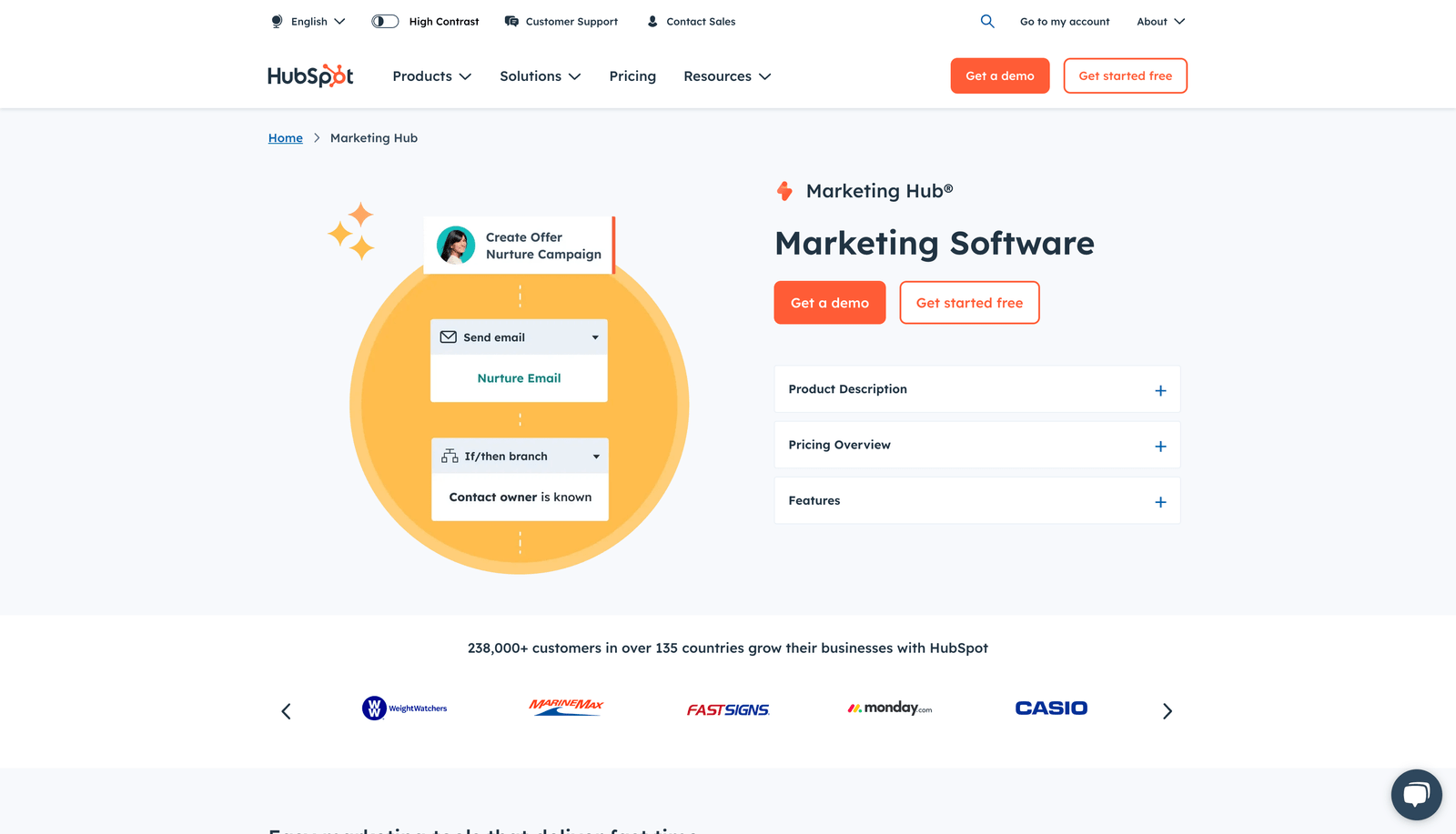
Features:
- Email and social media automation.
- Lead management with integrated CRM.
- Dynamic landing page builder with drag-and-drop functionality.
- Marketing analytics, including campaign tracking and ROI measurement.
- AI-powered recommendations for content optimization.
Pricing:
- Free tier with essential features.
- Paid plans start at $20/month (Starter) and go up to $3,600/month (Enterprise).
Pros:
- User-friendly interface with minimal learning curve.
- Extensive integration with third-party apps and tools.
- Comprehensive knowledge base and excellent customer support.
Cons:
- Premium features can become costly for small businesses.
- Limited customization in some reporting dashboards.
Best For:
Small to medium-sized businesses looking for an easy-to-use, scalable platform.
Use Case:
A mid-sized B2B SaaS company automating lead nurturing and tracking customer touchpoints.
2. Marketo Engage (by Adobe)
Marketo Engage is a leading choice for enterprise businesses requiring deep personalization and advanced campaign management.
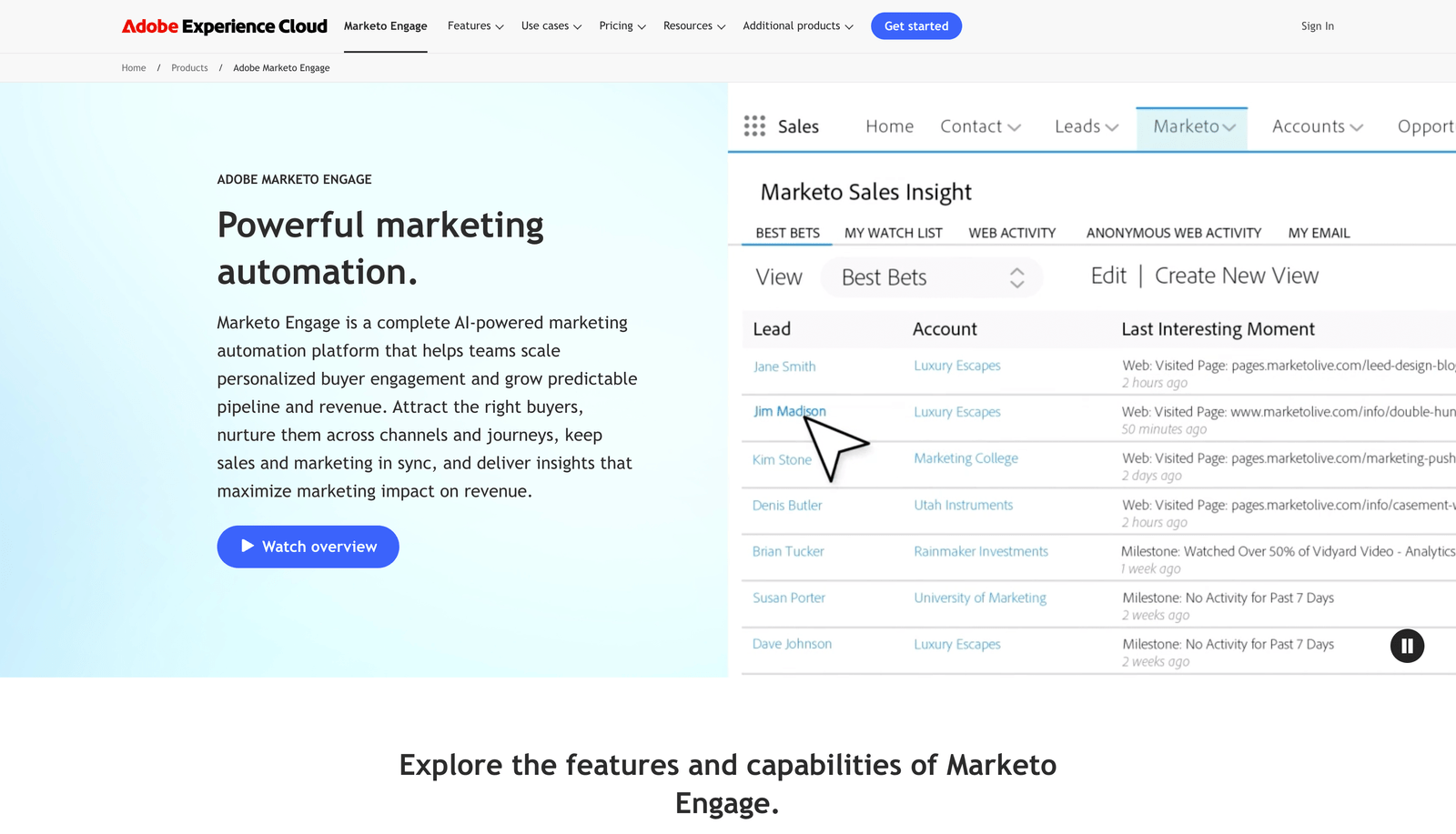
Features:
- AI-powered lead scoring and predictive analytics.
- Multi-channel campaign automation, including email, web, and mobile.
- Advanced segmentation for personalized messaging.
- Integration with Adobe Experience Cloud for holistic customer insights.
Pricing:
- Custom pricing tailored to business needs.
Pros:
- Scalable for enterprise needs with robust customization options.
- Superior analytics and reporting for performance optimization.
- Excellent for complex workflows and large teams.
Cons:
- Steep learning curve for new users.
- Requires significant investment and technical expertise.
Best For:
Large enterprises with advanced marketing needs.
Use Case:
A multinational B2B enterprise using AI-driven insights to execute highly personalized global campaigns.
3. ActiveCampaign
ActiveCampaign is a budget-friendly option that combines email marketing, automation workflows, and a built-in CRM.
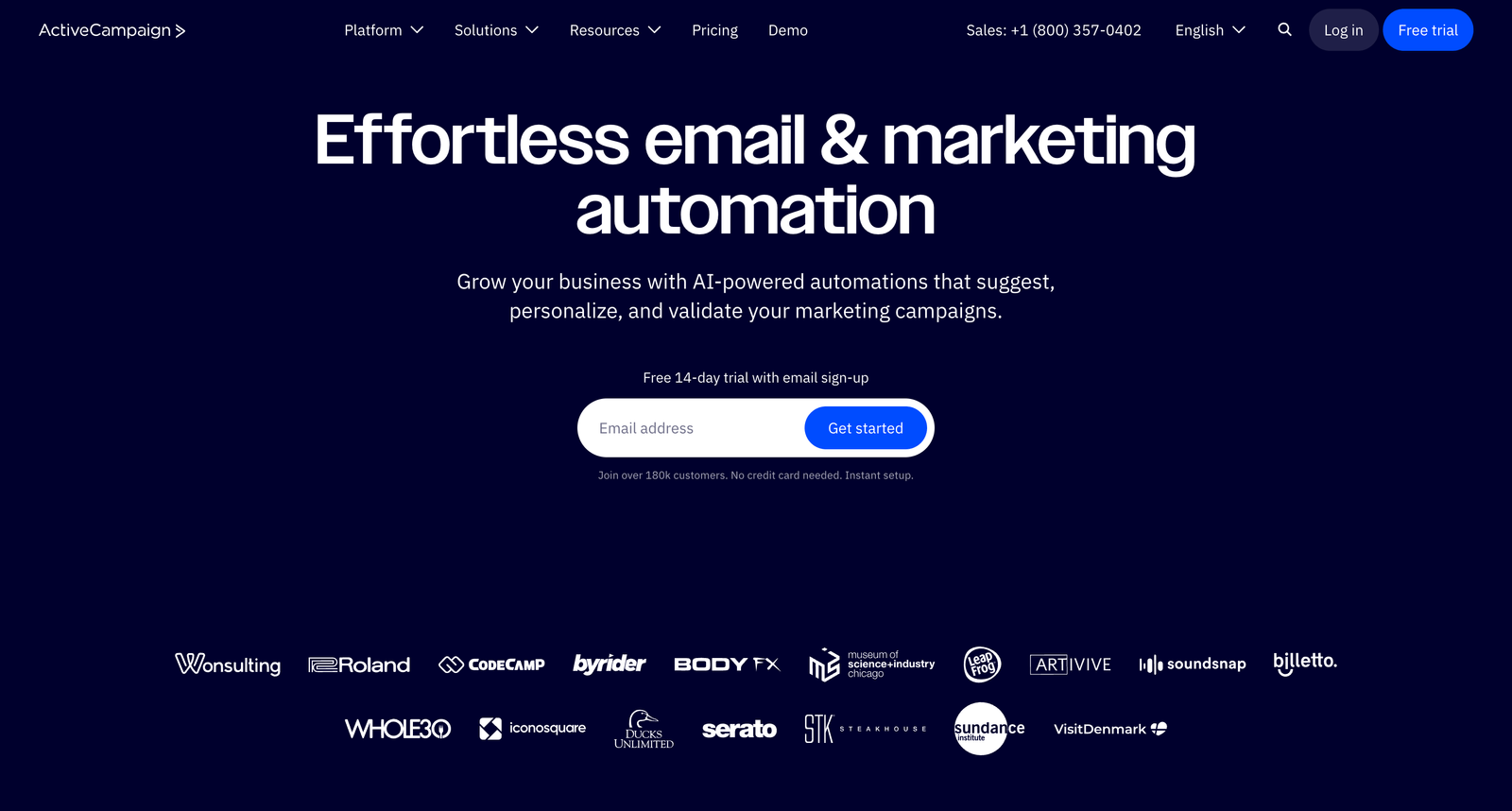
Features:
- Advanced email personalization and segmentation.
- Customer experience automation across email, SMS, and chat.
- Pipeline automation for sales teams.
- Robust integration options, including Shopify and WordPress.
Pricing: Different pricing plans available, starts at 15$ per month
Pros:
- Affordable for small and growing businesses.
- Highly intuitive interface with minimal learning curve.
- Exceptional customer service and training materials.
Cons:
- Reporting tools lack depth compared to competitors.
- Customization options are limited for complex workflows.
Best For:
Small to medium-sized businesses.
Use Case:
A B2B startup using automation to nurture leads and manage email campaigns effectively.
4. SharpSpring
SharpSpring offers an affordable and flexible b2b marketing automation software tailored to agencies and small-to-medium businesses.
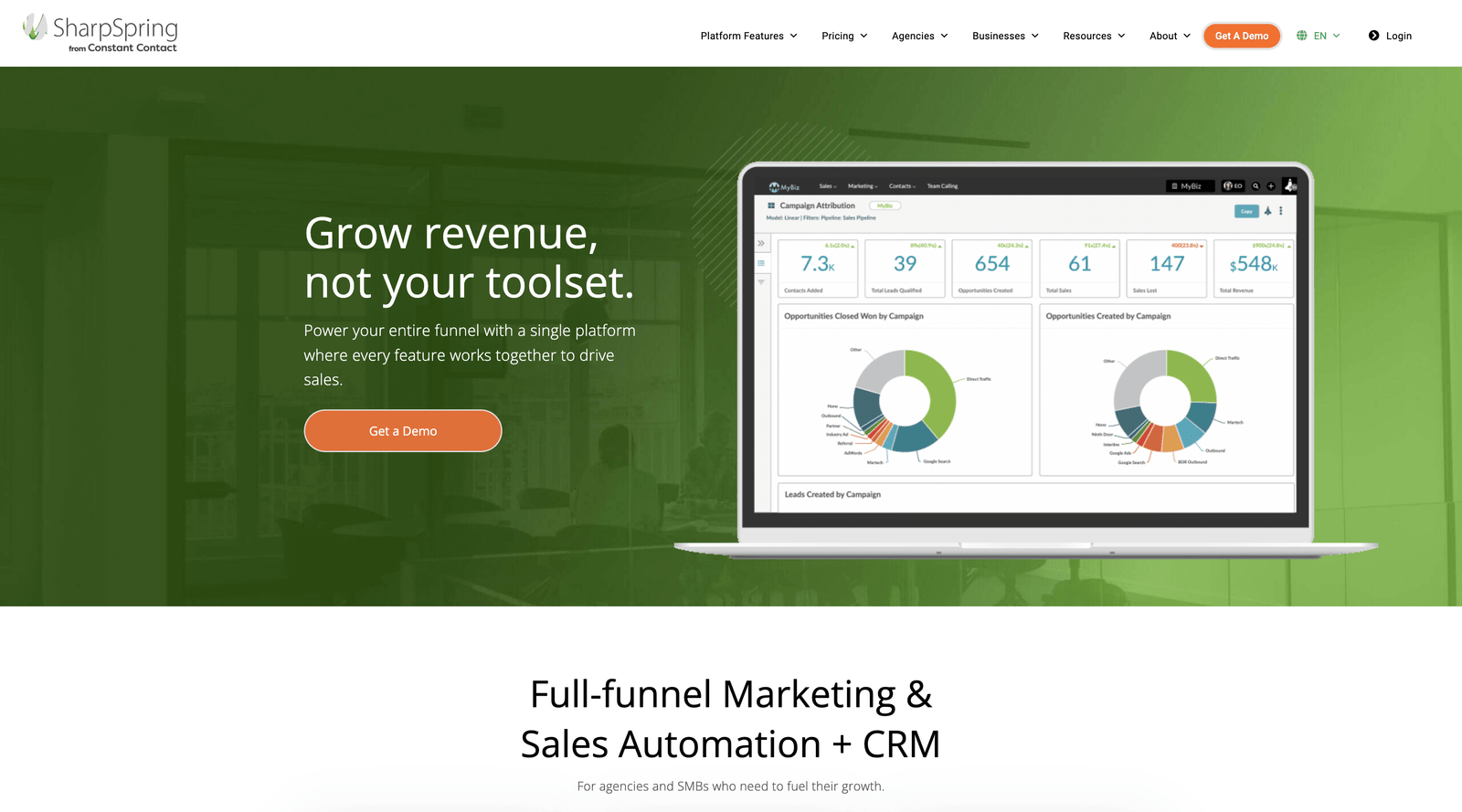
Features:
- Dynamic email personalization and automated workflows.
- Visitor tracking to identify website leads.
- Integrated CRM and social media management tools.
- Multi-device campaign tracking.
Pricing:
- You need to contact sales for pricing.
Pros:
- Affordable pricing with strong core features.
- Ideal for agencies managing multiple client accounts.
- Comprehensive analytics for lead tracking.
Cons:
- The user interface can feel outdated.
- Occasional system lags reported by users.
Best For:
Marketing agencies and SMBs focused on maximizing ROI.
Use Case:
A digital marketing agency automating lead generation for multiple clients.
5. Zoho Marketing Automation
Zoho provides a feature-packed solution for businesses seeking cost-effective automation.
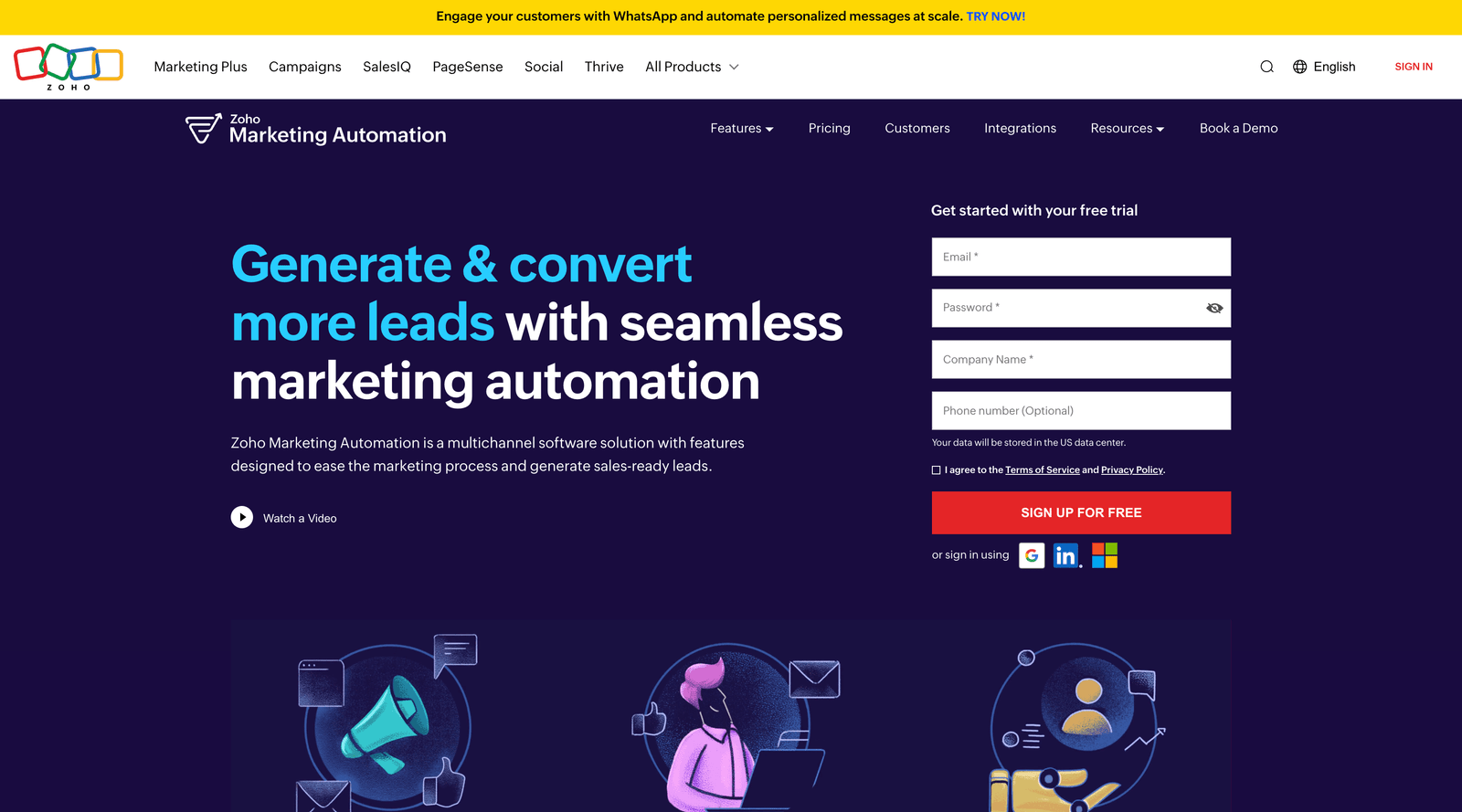
Features:
- Lead nurturing and scoring with multi-channel engagement.
- Automated email campaigns with A/B testing.
- Workflow automation for repetitive tasks.
- Integration with other Zoho tools, like CRM and Analytics.
Pricing:
- Standard plan starts at $14/month.
- Professional plan starts at $22/month.
- Professional plan starts at $44/month.
Pros:
- Extremely affordable for small businesses.
- Seamless integration with Zoho’s ecosystem.
- Easy-to-use interface for quick setup.
Cons:
- Advanced features are limited compared to premium competitors.
- May not scale as well for larger enterprises.
Best For:
Small businesses already using Zoho’s software suite.
Use Case:
A small business managing email campaigns and social media with minimal investment.
How to Get Started with B2B Marketing Automation Platforms in 2025
Now that you’ve seen the top B2B marketing automation platforms, the next step is implementing the right tool for your business. Here’s a step-by-step guide to help you seamlessly integrate automation into your marketing strategy and get the most out of your chosen platform.
Define Your Marketing Goals
Before diving into automation, be clear about what you want to achieve. Some common goals include:
- Generating more leads.
- Nurturing existing leads effectively.
- Aligning sales and marketing teams.
- Improving ROI on campaigns.
Clearly defining your objectives will help you choose the right tool and set up workflows that align with your business needs.
Map Out Your Customer Journey
Understanding how your customers move through the sales funnel is crucial. Identify:
- The stages of your customer journey (e.g., awareness, consideration, decision).
- Key touchpoints where automation can make an impact (e.g., email follow-ups, lead scoring).
Create a visual map of your buyer’s journey to identify where your automation tool can provide value.
Choose the Right Automation Tool
Refer back to the tools listed earlier and pick one that fits your business size, budget, and goals. Consider factors like:
- Integration with your existing CRM or sales tools.
- Scalability as your business grows.
- User-friendliness and support resources.
If unsure, start with free trials or demo versions to explore their features before committing.
Set Up Your Automation Workflows
Once you’ve chosen a tool, configure workflows to automate repetitive tasks. Examples include:
- Sending welcome emails to new leads.
- Triggering follow-up emails based on user actions.
- Scoring leads based on behavior (e.g., opening emails, visiting key pages).
Most b2b marketing automation platforms offer pre-built templates to help you get started, so you don’t have to build everything from scratch.
Integrate Automation with Your CRM and Other Tools
Ensure your b2b marketing automation platforms integrates seamlessly with your existing tools, such as:
- CRM (e.g., Salesforce, Zoho CRM) for unified data management.
- Analytics tools (e.g., Google Analytics) to measure campaign performance.
- Social media platforms for automated posting and engagement tracking.
Integration ensures that information flows seamlessly between platforms, reducing manual input and errors.
Train Your Team
Automation tools are only as effective as those who use them. Provide your team with the necessary training to:
- Set up workflows and campaigns.
- Monitor performance analytics.
- Troubleshoot common issues.
Many tools, like HubSpot and ActiveCampaign, offer free tutorials and extensive knowledge bases.
Monitor and Optimize
Once your automation workflows are live, keep an eye on their performance. Use built-in analytics to:
- Track key metrics including open rates, click-through rates, and conversions.
- Identify bottlenecks or areas needing improvement.
- A/B test workflows to optimize results.
For example, test subject lines in email campaigns or experiment with different lead scoring criteria.
Scale Your Efforts
Your business’s automation requirements will change as it grows. Look for ways to scale:
- Add more workflows to cover additional customer touchpoints.
- Upgrade your tool’s plan to unlock advanced features.
- Explore AI-driven capabilities for personalization and predictive analytics.
Scaling ensures your automation keeps pace with your expanding business goals.
Final Thoughts
Getting started with B2B marketing automation platforms in 2025 is a straightforward process if you approach it strategically. By defining clear goals, choosing the right tool, and optimizing your workflows, you’ll not only save time but also significantly enhance your marketing outcomes.
Conclusion
In today’s competitive B2B market, marketing automation is essential for saving time, improving ROI, and enhancing customer engagement. The right B2B marketing automation platform can streamline operations, nurture leads effectively, and align sales and marketing efforts.
Whether you choose ActiveCampaign for affordability, HubSpot for scalability, or Marketo Engage for advanced features, there’s a solution tailored to your needs. Define your goals, map your customer journey, and select a tool that fits your business to achieve measurable success.
Now is the time to embrace automation and take your B2B marketing strategy to the next level! Get started with these B2B marketing automation platforms.
Looking to further optimize your business operations? Check out our detailed guide on the 10 Best AI Tools for Business to discover more cutting-edge solutions that can drive growth and efficiency.
References:
https://www.marketsandmarkets.com/PressReleases/marketing-automation-software.asp
https://blog.hubspot.com/marketing/marketing-automation-benefits
